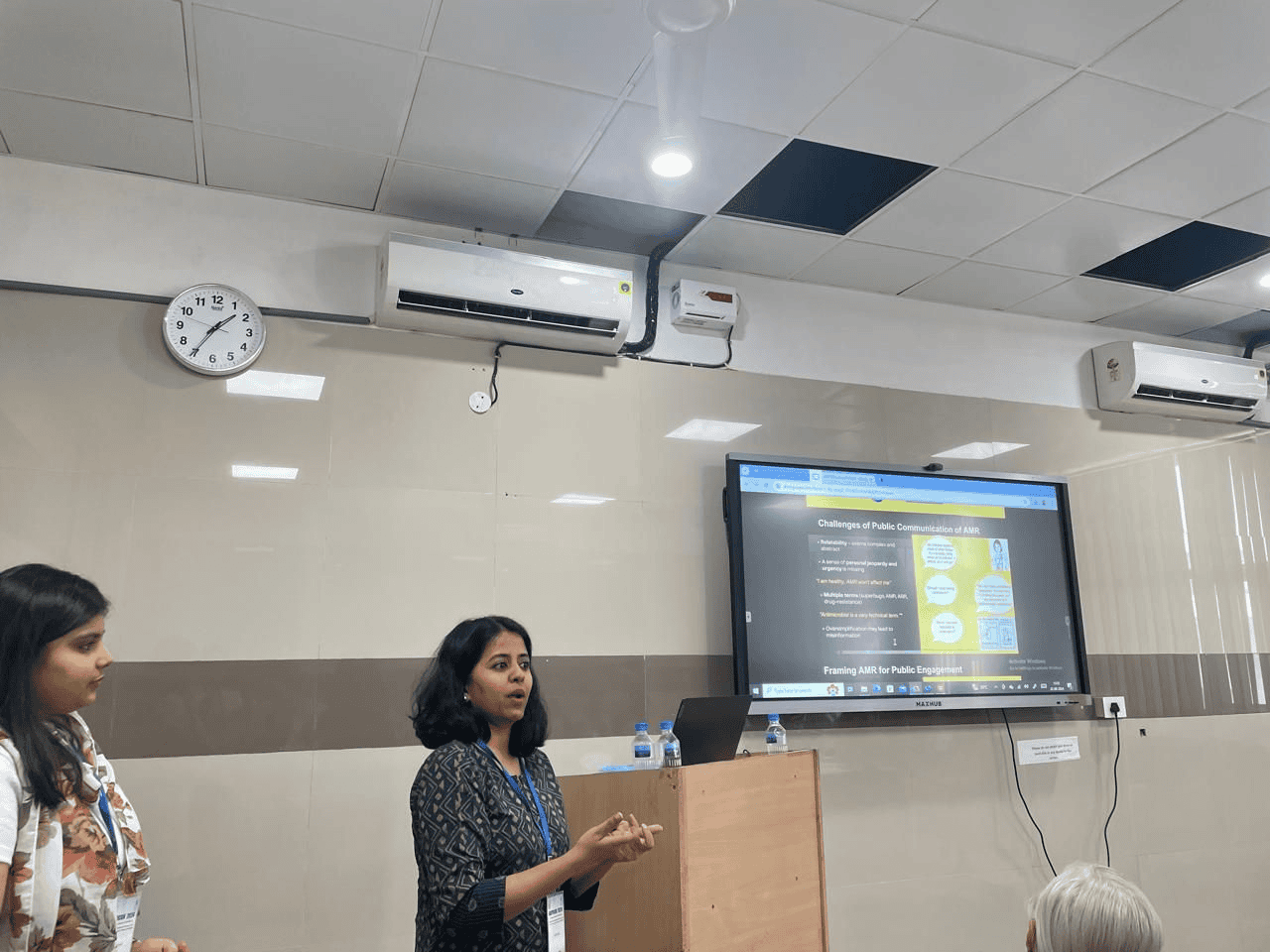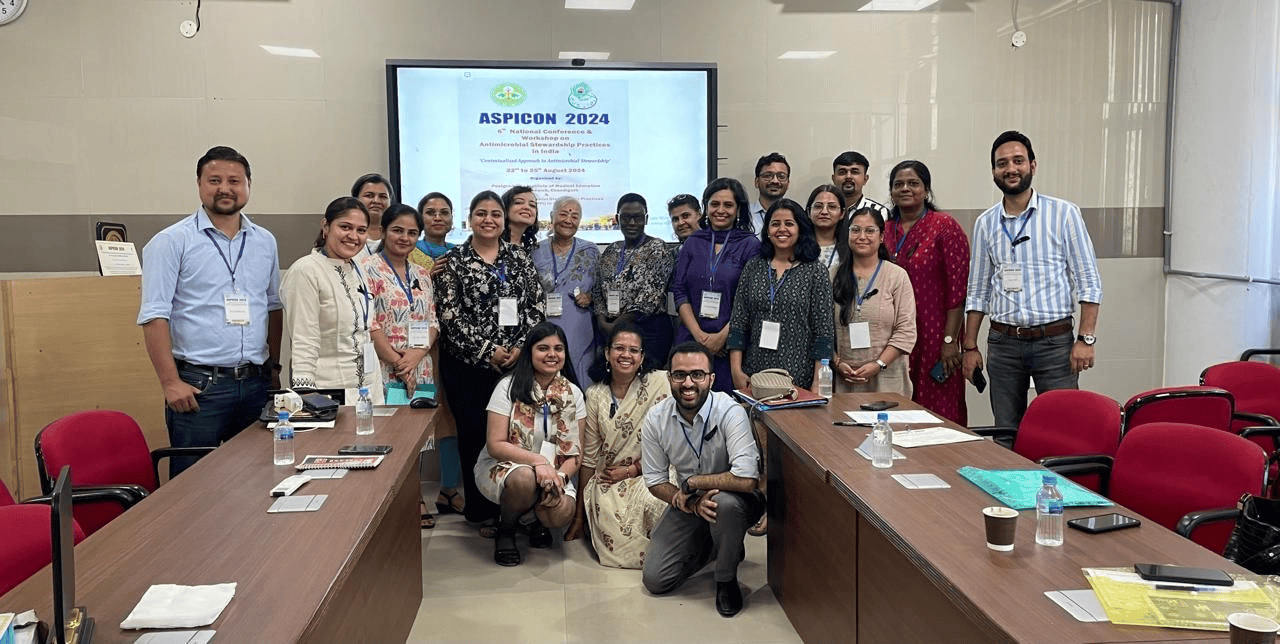On August 22, 2024, Superheroes Against Superbugs (SaS) participated in a dynamic pre-conference workshop on “Investigating the Intersection of Sociocultural Determinants of Health and Antimicrobial Resistance (AMR)” at PGIMER Chandigarh. Organised alongside the Annual Conference of the Society of Antimicrobial Stewardship Practices in India (ASPICON 2024), this gathering brought together healthcare experts, particularly clinical pharmacists, social science researchers, and community engagement practitioners, to explore the deep connections between culture, behaviour, and health, with a focus on how these factors influence the spread of AMR.
At SaS, we’ve always believed that addressing AMR, particularly in a country like India, requires more than just medical or scientific solutions—and that conveying the urgency of AMR goes beyond simply sharing facts and figures. People’s beliefs, behaviours, knowledge, and environments significantly influence both the rise and spread of AMR and the effectiveness of efforts to combat it.
This workshop highlighted how socio-cultural determinants—like caste, gender, health-seeking behaviours, and community norms—shape the way people are affected by and respond to health challenges like AMR and how they interact with healthcare systems.
For instance, caste hierarchies in India often dictate occupations like sanitation work and influence access to essentials such as clean water and healthcare. Additionally, in many communities, women may face restrictions that limit their autonomy in seeking medical care and challenges in managing personal health needs. These realities make some communities more vulnerable to infections and AMR than the others. These factors, often overlooked in AMR research, are critical in designing tailored awareness, behaviour change or health interventions that truly work for all.
At the workshop, Sarah Hyder Iqbal and Khushi Goel from SaS team shared their unique approach to engaging communities in the fight against AMR, focussing on our work with young people (school students and UG/PG medical, pharmacy and science students) and the general public through diverse creative methods. By using storytelling, participatory murals, interactive games, and fun learning tools, we make the science of AMR accessible and relatable and its solutions intuitive. We discussed how these creative approaches help demystify complex concepts and inspire people to take action in their everyday lives. Our experiences in community engagement, especially with young people, showed that when information resonates with people’s lived realities, it not only increases awareness but also motivates ownership and action.

Participating in hands-on case studies during the workshop allowed us to explore these themes in real-world scenarios as we worked with other participants to investigate a bacterial outbreak in an underserved community. Group discussions, led by Dr Vrinda Nampoothiri and Dr. Ritika Kondal Bhandari, focused on how different population groups experience crises in unique ways and why public health responses must consider these differences—particularly in low-resource settings where structural inequities like caste and gender discrimination influence access to care.
This exercise through role play also helped us appreciate the unique roles of different stakeholders, such as governments, policymakers, health agencies like WHO, healthcare providers, and communities, and the challenges they face while addressing an outbreak. It highlighted how each group’s actions and decisions, influenced by socio-cultural and systemic factors, shape the outcomes of health interventions, particularly in times of crisis. For instance, during the exercise, one team represented local government officials facing pressure to quickly contain an outbreak, while another team took on the role of healthcare providers striving to balance limited resources with patient care needs. This scenario brought to light the tension between urgent public health measures and the realities of implementing them on the ground, emphasising how decisions at various levels affect both the effectiveness of interventions and the trust within communities.
For SaS, this workshop was more than just an academic exercise—it was a powerful reminder of the complexity of AMR and why we do what we do. The intersection of social, cultural, and health factors cannot be ignored if we are to tackle AMR effectively in a country as complex and diverse as India. We left the workshop energised, with new perspectives and ideas on how to further our mission of raising awareness about superbugs through creative, community-driven initiatives that take into account diverse lived experiences and socio-cultural aspects of health to make a lasting impact in the fight against deadly superbugs…because when it comes to fighting superbugs, understanding the whole picture makes all the difference.
